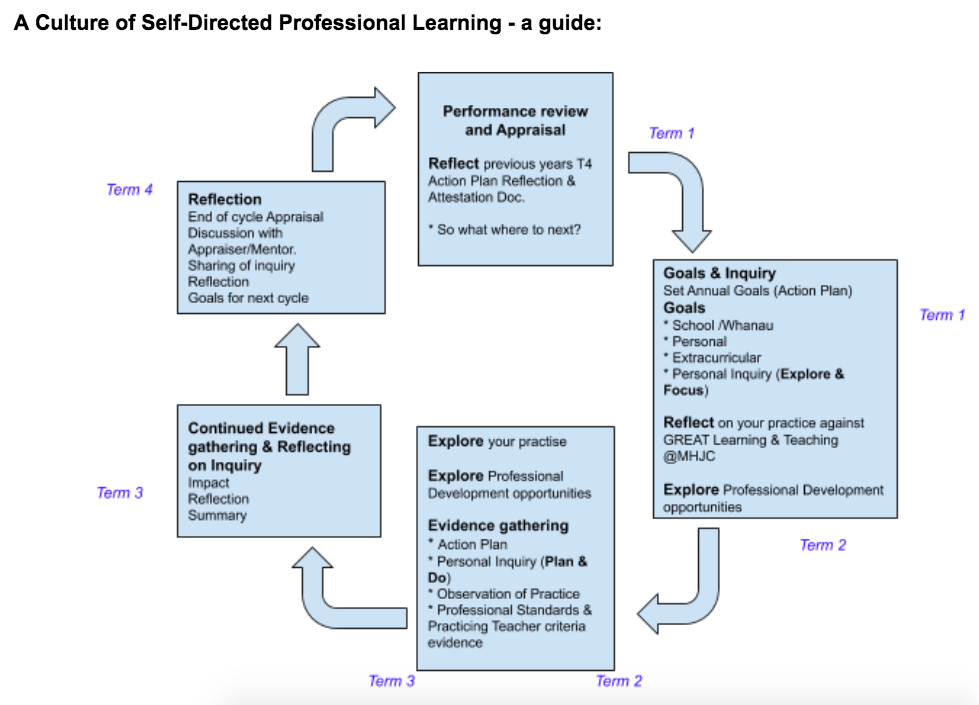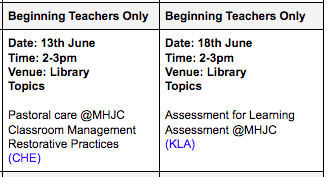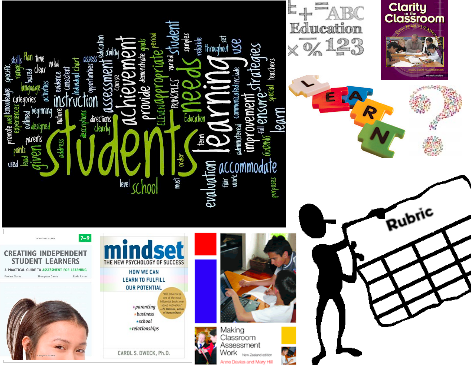Beginning Teachers
Section outline
-
WHAT MAKES A GOOD INDUCTION PROGRAMME?
An induction and mentoring programme may look different from one setting to another. This will depend on what sort of institution it is (school, early childhood or kura) and whether it is urban, rural, large, small, isolated, part of a cluster and so on. But there are some essential features that should be included when developing effective induction programmes for PCTs.
Induction and mentoring programmes should:
- be tailored to individual needs and agreed with the PCT, mentor teacher and professional leader
- include regular observations of teaching practice and opportunities for the PCT to observe their colleagues, including the mentor teacher
- have time for ‘learning conversations' where the mentor provides feedback and facilitates critical reflection by the teacher on their practice
- be part of wider professional development and learning available to all staff
- include access to external networks and professional development opportunities
- provide opportunities to collect evidence of progress towards meeting the registration standards in the Standards for the Teaching Profession
- be resourced appropriately and meet the contractual obligations of the employer
- have formal written records documenting professional discussions, observations and feedback, critical reflections on data by the PCT and any other professional development.
-
Staff handbook:
Performance Management
At MHJC our Performance Management system is focused on GREAT Learning and Teaching @MHJC. This process is made up of the following elements:
Appraisal Action Plan - Setting your Annual Goals
Attestation documentation - Evidence gathered against the Professional Standards and the Practising Teacher Criteria.
Observation of classroom practice
Personal Inquiry
Portfolio of evidence - site, ePortfolio, MHJC blog, Google Drive folders to show evidence of your practice related to the Professional Standards and Practicing Teacher Criteria and Attestation.
All the above should cycle together supporting each other. Your Appraisal Action Plan has your goals that are developed from your needs identified at the end of your previous cycle or from gaps in your evidence or practice. We use GREAT Learning & Teaching @MHJC to guide this reflection process
The appraisal process exists to affirm and develop a high standard of teaching in New Zealand. Effective appraisal systems using the Standards for the Teaching Profession help teachers learn, grow and achieve the best outcomes for our learners.
The stages of MHJC Appraisal System see the diagram of the components below:

-
Staff handbook:
Health and Safety
Everybody in the school has a responsibility for health and safety. We believe that a safe, hygienic, attractive and healthy environment is essential. All staff must take reasonable care for their own health and safety and the health and safety of their students. Staff must take reasonable care that their actions do not affect the health and safety of others. All staff must comply, as far as reasonably able, with any reasonable instructions that are given to them by the school management and the Policy and Procedures of the BOT relating to Health and Safety.
All staff are responsible for making sure they have a current Police Clearance Certificate. Teachers are covered by their teacher registration. Staff must ensure that all volunteers engaged in school activities must be accompanied by a staff member and if NOT they must have Police Clearance. All volunteers must have Police Clearance for ALL overnight trips.
If a staff member invites someone to the school they must seek permission from the Principal or Associate Principal and they are responsible for informing them about our Emergency Procedures.
Please report any hazards to the Property Help Desk and take appropriate interim action. If it is an emergency please immediately inform the Principal or Associate Principal or a Senior Leader of the hazard.
-
Staff handbook:
EOTC / Trips Outside the School
Students are exposed to a variety of appropriate EOTC experiences. All EOTC needs to be approved in advance by the Associate Principal. Bus hire can be arranged through the Accounts Administrator. The costs of trips will be calculated carefully and all money collected in advance unless specific arrangements are made with the Principal or Senior Leader with delegated responsibility for EOTC. It is the responsibility of the organising teacher to ensure all costs are covered/recovered. This includes the Field Allowance for overnight trips. Where possible the school car/van is to be used rather than teachers’ personal vehicles.
It is very important that the EOTC Policy and Procedures in this regard are closely adhered to in order that safety and risk considerations are addressed. Please refer to the policy and procedures for further information and the required forms (see staff folder).
EOTC documents (Activity Sheet and Risk Analysis Form) for trips outside the school must be approved at least TWO WEEKS before the trip.
-
Staff Handbook:
Behaviour Management
We believe that a stimulating, well-planned and delivered classroom programme is the first step in positive behaviour management. When students are engaged and achieving well, they are likely to be behaving appropriately. Students thrive on consistency, routines and clear expectations. Please make positive behaviour management techniques such as verbal praise, stickers and other rewards and acknowledgements an integral and important part of your classroom culture.
We believe in “catching children being good.” Students should always be treated with dignity and respect. Any disciplinary measures should be used as a last resort and should be considered carefully. Students should never be humiliated or put at risk in any way. Corporal punishment is illegal and must never be used.
Focus on the behaviour and attempt to change it, as a first response. When you handle a situation well it increases your ‘mana’ as a teacher and adult and is a strong and appropriate response. Reliance on negative strategies of punishment undermines your position in the long term. Handing on minor issues can also undermine your mana. It is not our way to simply pass on all issues to someone else to handle.
We do not have detentions at MHJC. If student behaviour is inappropriate firstly address this with the student. If there is no improvement contact the parent early and make them aware of your concern (advise your DP before doing so). Do not ignore negative or dangerous behaviours. If you have ongoing concerns about the behaviour of a child in your class, please consult with your Whanau colleagues at PLC meetings in the first instance. If this is not effective and the behaviour is ongoing or escalates please refer to the DP of your whanau. If the concern relates to non completion or unsatisfactory work please follow the same process but refer to the AP as opposed to the DP. Please do not use the homework club as an after school detention.
There is no place in our classrooms for shouting by either students or teachers. Please do not raise your voice. This is ineffective and signals a loss of control which students are very attuned to. Sound field systems allow us to speak softly but audibly. Please make use of them if necessary.
Self-Harming Behaviour Management Plan, support for student, school and parents.
-
Good morning, welcome to our first 'Effective Assessment' session.
Activities:
- Where does 'Effective Assessment' fit in with regard to the Principles of Learning and Teaching?
- Bus Stop activity - what knowledge and understanding of Effective Assessment do we have?
Purpose, Principles and Pedagogy - First glance evaluation of our prior knowledge
- Group work - critique our prior knowledge using PPP information cards
Resources:
Principles of Learning and Teaching
Poster paper and pens
PPP laminated information cardsExploring Effective Assessment powerpoint - adapted from TKI
Homework:
No homework :0) -
Our focus is to concrete in a common understanding/definition of Effective Assessment/Assessment for Learning, to discuss why this is important and understand where it fits in the model of education in 21st Century.
Activities:
- Make links to last weeks session - share the critique of the classes prior knowledge
- Common definition/understanding: what does it look like for the student? What does it look like for the teacher?
- Where does Effective Assessment fit in a model of 21st century education? Why is effective assessment important? Ken Robinson - Changing Paradigms in Education
Resources:
Definitions of Effective Assessment from TKI
Video - Ken Robinson
-
Activities:
- Connect to previous session - Principles of Effective Assessment - prioritise as a group
- Ruth Sutton Powerpoint
- Professional Readings - uploaded below
Resources:
"Inside the Black Box - Raising Standards Through Classroom Assessment" By Paul Black and Dylan Williams
"Mindset; The new psychology of success" By Carol S Dweck. Chapters 1,2,3 - also in our teacher resource library
Absolum, M. (2006). Clarity in the classroom. Auckland: Hodder Education. pp 76–95. In our teacher resource library
Clarke, S. (2001). Unlocking formative assessment: Practical strategies for enhancing pupils’ learning in the primary classroom. London: Hodder and Stoughton. In our teacher resource library
"Making Classroom Assessment Work" By Anne Davies and Mary Hill. Chapters 3, 4, 6
"Assessment For Learning" by Ruth Sutton. Chapters 1, 2, 4 In our teacher resource library
"Testing Motivation and Learning" by Assessment Reform Group, 2002.
-
Activities:
- Share Professional Readings - discuss how these ideas may affect your practice. Reflect on our current practice, school structures, discussion at writing PD etc. Are we supporting these ideas?
- What will this look like in the classroom - practical application? Build a matrix of ideas, tools, strategies
- Choose a strategy/range of strategies to develop and use with your current assessment
- Reflect and share this with the group
Professional Readings - uploaded in the previous week
AFL Tools powerpoint
Top Tools for Literacy and Thinking – David Whitehead
Group Work short video clip
-
Assessment
Formative assessment and the use of evidenced based data to inform practice is regarded as very important at MHJC. These practices are embedded in our teaching and learning framework and are integral to the enhancement of quality teaching practices and improved student outcomes. Assessment should not drive learning at MHJC.
Other than easTTle baseline (previous years end of year), mid year and post testing (two per year) and Year 9 and 10 examinations there is no coordinated school wide assessment. The learning programme in each class and Whanau should determine assessment practice. Please avoid “end of term” assessment.
All assessment is based on rubrics. These rubrics are NZC aligned, Achievement Objective focused and approved by your Learning Area before publication. Approved rubrics are loaded as templates on MHOL. Only approved rubric templates are used. Mentors support and approve the assessment tasks developed for the approved rubric. These should be available to students early in the learning process.
Results are reported as Achieving at Curriculum, Achieving Above Curriculum, Achieving Beyond Curriculum.
Quality, timely feedback and feedforward is an expected part of any assessment process. It is an expectation that all assessment work is submitted. For late submissions, a maximum grade of Achieved will apply. Assessment results will be shared at PLC each Thursday as part of our focus on student achievement.
Assessment and eReporting Requirements:- Yr 7 and 8 Core subjects - 3x assessments annually. All assessments have feedforward/feedback for students with 2 formal reporting comments (1&3)
- Yr 7 and 8 Chunked Specialist Learning Area - a termly assessment with formal reporting comment
- Yr 7 and 8 Languages - 1x assessment each half year with formal reporting comment
- Yr 9 and 10 Core subjects - 3x assessments annually. All assessments have feedforward/feedback for students with 2 formal reporting comments (1&3) plus an Examination (Common paper)
- Yr 9 and 10 Option subjects - 2x assessments annually. All assessments have feedforward/feedback for students. One with formal reporting comment.
The expectation of reports and feedback/feed forward are as follows:
Assessment 1 (Term 1) and Assessment 3 (Term 3 Yr 9/10; Term 3 or 4 Yr 7/8)
- Feedback and feedforward on students work (marking/marks/written notes/visual/verbal). Evidence of this needs to be accessible to students, learning advisors and parents.
- eReport has highlighted criteria in the rubric to indicate feedback and a formal written feedforward comment.
Assessment 2 (Term 2) and Yr 9 & 10 Examinations
- Feedback and feedforward on students work (marking/marks/written notes/visual/verbal). Evidence of this needs to be accessible to students, learning advisors and parents.
- eReport has highlighted criteria in the rubric to indicate feedback only.
Assessment - resubmission
Assessment for learning is a guiding principle for effective teaching and learning. Teachers will provide students with authentic assessment opportunities which enhance the learning process.
As part of our preparation of students for future NCEA assessment and as a principle of effective learning, teachers provide feedback and feedforward at predetermined checkpoints. Students may be granted the opportunity to resubmit at the teacher’s discretion provided a genuine effort had been made. Any queries relating to this process should be directed to the Assistant Principal who will address the concern appropriately.
Year 7 students should be supported by completing assessments in class rather than at home;
Teachers should provide adequate feedback/feedforward at predetermined checkpoints ahead of submission (evidence should be kept);
If a resubmission opportunity is not available, owing to the nature of the assessment, students must be notified at the beginning of the assessment and this must be recorded in the assessment task instructions
-


